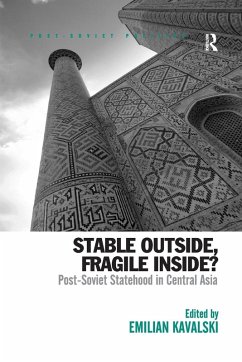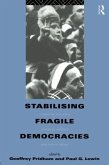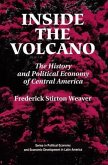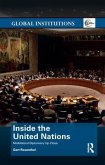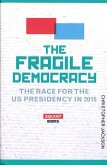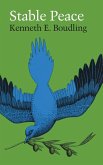Stable Outside, Fragile Inside?
Post-Soviet Statehood in Central Asia
Herausgeber: Kavalski, Emilian
Stable Outside, Fragile Inside?
Post-Soviet Statehood in Central Asia
Herausgeber: Kavalski, Emilian
- Broschiertes Buch
- Merkliste
- Auf die Merkliste
- Bewerten Bewerten
- Teilen
- Produkt teilen
- Produkterinnerung
- Produkterinnerung
This timely volume analyses the quality of statehood in Central Asia by assessing the complex dynamics of Central Asian state-making and focusing on the simultaneous patterns of socialization and internalization in the region - thus bringing Central Asia into the mainstream of systematic interrogation.
Andere Kunden interessierten sich auch für
![Stabilising Fragile Democracies Stabilising Fragile Democracies]() Stabilising Fragile Democracies79,99 €
Stabilising Fragile Democracies79,99 €![Inside Gorbachev's Kremlin Inside Gorbachev's Kremlin]() Yegor LigachevInside Gorbachev's Kremlin78,99 €
Yegor LigachevInside Gorbachev's Kremlin78,99 €![Inside The Volcano Inside The Volcano]() Frederick Stirton WeaverInside The Volcano54,99 €
Frederick Stirton WeaverInside The Volcano54,99 €![Inside the United Nations Inside the United Nations]() Gert RosenthalInside the United Nations58,99 €
Gert RosenthalInside the United Nations58,99 €![The Fragile Democracy: The Race for the Us Presidency in 2016 The Fragile Democracy: The Race for the Us Presidency in 2016]() Christopher JacksonThe Fragile Democracy: The Race for the Us Presidency in 201614,99 €
Christopher JacksonThe Fragile Democracy: The Race for the Us Presidency in 201614,99 €![Stable Peace Stable Peace]() Kenneth E. BouldingStable Peace23,99 €
Kenneth E. BouldingStable Peace23,99 €![Inside Affirmative Action Inside Affirmative Action]() Karin Williamson PedrickInside Affirmative Action60,99 €
Karin Williamson PedrickInside Affirmative Action60,99 €-
-
-
This timely volume analyses the quality of statehood in Central Asia by assessing the complex dynamics of Central Asian state-making and focusing on the simultaneous patterns of socialization and internalization in the region - thus bringing Central Asia into the mainstream of systematic interrogation.
Produktdetails
- Produktdetails
- Verlag: Routledge
- Seitenzahl: 254
- Erscheinungstermin: 30. November 2016
- Englisch
- Abmessung: 234mm x 156mm x 14mm
- Gewicht: 392g
- ISBN-13: 9781138254367
- ISBN-10: 1138254363
- Artikelnr.: 57050894
- Herstellerkennzeichnung
- Libri GmbH
- Europaallee 1
- 36244 Bad Hersfeld
- gpsr@libri.de
- Verlag: Routledge
- Seitenzahl: 254
- Erscheinungstermin: 30. November 2016
- Englisch
- Abmessung: 234mm x 156mm x 14mm
- Gewicht: 392g
- ISBN-13: 9781138254367
- ISBN-10: 1138254363
- Artikelnr.: 57050894
- Herstellerkennzeichnung
- Libri GmbH
- Europaallee 1
- 36244 Bad Hersfeld
- gpsr@libri.de
Emilian Kavalski is Associate Professor of Global Studies at the Institute for Social Justice, Australian Catholic University (Sydney). He is currently working on (i) the encounter of International Relations with life in the Anthropocene, especially the conceptualization of and engagement with non-human actors; and (ii) the nascent Asian normative orders and the ways in which they confront, compliment, and transform established traditions, norms, and institutions. Emilian contends that in both these areas the application of Complexity Thinking has important implications for the way global life is approached, explained, and understood. At the same time, these research foci sketch a prolegomenon to the conceptual contexts of theory-building and policy-making intent on facilitating economic, social, and environmental interactions that promote the well-being of people in ways that are just, equitable, and sustainable.
The international politics of fusion and fissure in the awkward states of
post-Soviet Central Asia, Emilian Kavalski; Part 1 Analytical Perspectives
on the Post-Soviet Statehood of Central Asia: Applying the democratization
literature to post-Soviet Central Asian statehood, Paul Kubicek; The
problems of the 'clan' politics model of Central Asian statehood: a call
for alternative pathways for research, David Gullette; The international
political economy of Central Asian statehood, Martin C. Spechler and Dina
R. Spechler; Central Asian statehood in post-colonial perspective, John
Heathershaw. Part 2 Insights from the Processes of Localization in the
Dynamics of Central Asian State-Making: International democratic norms and
domestic socialization in Kazakhstan: learning processes of the power
elite, Kirill Nourzhanov; International agency in Kyrgyzstan: rhetoric,
revolution and renegotiation, Claire Wilkinson; The limits of international
agency: post-Soviet state building in Tajikstan, Lawrence P. Markowitz;
Turkmenistan: flawed, fragile and isolated, Steven Sabol; Stalled at the
doorstep of a modern state: neopatrimonial regime in Uzbekistan, Alisher
Ilkhamov; Bibliography; Index.
post-Soviet Central Asia, Emilian Kavalski; Part 1 Analytical Perspectives
on the Post-Soviet Statehood of Central Asia: Applying the democratization
literature to post-Soviet Central Asian statehood, Paul Kubicek; The
problems of the 'clan' politics model of Central Asian statehood: a call
for alternative pathways for research, David Gullette; The international
political economy of Central Asian statehood, Martin C. Spechler and Dina
R. Spechler; Central Asian statehood in post-colonial perspective, John
Heathershaw. Part 2 Insights from the Processes of Localization in the
Dynamics of Central Asian State-Making: International democratic norms and
domestic socialization in Kazakhstan: learning processes of the power
elite, Kirill Nourzhanov; International agency in Kyrgyzstan: rhetoric,
revolution and renegotiation, Claire Wilkinson; The limits of international
agency: post-Soviet state building in Tajikstan, Lawrence P. Markowitz;
Turkmenistan: flawed, fragile and isolated, Steven Sabol; Stalled at the
doorstep of a modern state: neopatrimonial regime in Uzbekistan, Alisher
Ilkhamov; Bibliography; Index.
The international politics of fusion and fissure in the awkward states of
post-Soviet Central Asia, Emilian Kavalski; Part 1 Analytical Perspectives
on the Post-Soviet Statehood of Central Asia: Applying the democratization
literature to post-Soviet Central Asian statehood, Paul Kubicek; The
problems of the 'clan' politics model of Central Asian statehood: a call
for alternative pathways for research, David Gullette; The international
political economy of Central Asian statehood, Martin C. Spechler and Dina
R. Spechler; Central Asian statehood in post-colonial perspective, John
Heathershaw. Part 2 Insights from the Processes of Localization in the
Dynamics of Central Asian State-Making: International democratic norms and
domestic socialization in Kazakhstan: learning processes of the power
elite, Kirill Nourzhanov; International agency in Kyrgyzstan: rhetoric,
revolution and renegotiation, Claire Wilkinson; The limits of international
agency: post-Soviet state building in Tajikstan, Lawrence P. Markowitz;
Turkmenistan: flawed, fragile and isolated, Steven Sabol; Stalled at the
doorstep of a modern state: neopatrimonial regime in Uzbekistan, Alisher
Ilkhamov; Bibliography; Index.
post-Soviet Central Asia, Emilian Kavalski; Part 1 Analytical Perspectives
on the Post-Soviet Statehood of Central Asia: Applying the democratization
literature to post-Soviet Central Asian statehood, Paul Kubicek; The
problems of the 'clan' politics model of Central Asian statehood: a call
for alternative pathways for research, David Gullette; The international
political economy of Central Asian statehood, Martin C. Spechler and Dina
R. Spechler; Central Asian statehood in post-colonial perspective, John
Heathershaw. Part 2 Insights from the Processes of Localization in the
Dynamics of Central Asian State-Making: International democratic norms and
domestic socialization in Kazakhstan: learning processes of the power
elite, Kirill Nourzhanov; International agency in Kyrgyzstan: rhetoric,
revolution and renegotiation, Claire Wilkinson; The limits of international
agency: post-Soviet state building in Tajikstan, Lawrence P. Markowitz;
Turkmenistan: flawed, fragile and isolated, Steven Sabol; Stalled at the
doorstep of a modern state: neopatrimonial regime in Uzbekistan, Alisher
Ilkhamov; Bibliography; Index.

